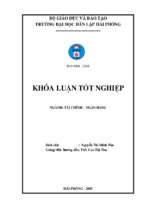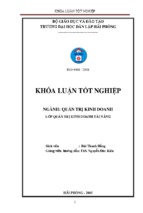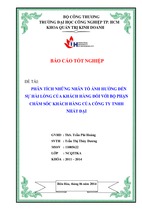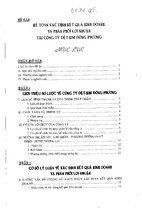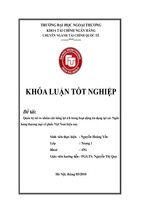UNIVERSITY OF ECONOMICS AND LAW
Faculty of Information Systems
----------------
REPORT
ACCOUNTING INFORMATION SYSTEM
Topic: E-Commerce Business and Accounting problems in
E-commerce
Lecturer: MSc. Vũ Văn Điệp
Group members:
1. Đinh Hoàng Duy
K194060844
2. Phan Kỳ Khánh Chiêu
K194060843
3. Phan Quang Minh Long
K194060852
4. Nguyễn Hà Thy
K194060876
5. Nguyễn Ngọc Phương Uyên
K194060879
Ho Chi Minh City, August, 2022
Table of Contents
1.
Overview E-commerce and Accounting Information System (AIS)
1.1. E-commerce
3
1.1.1.
Definition
3
1.1.2.
Types of E-commerce
3
1.1.3.
The benefit of E-commerce
4
1.1.4.
E-commerce in Vietnam
4
1.2. Accounting Information System (AIS)
2.
3
5
1.2.1.
What is an AIS?
5
1.2.2.
How can an AIS add value to an organization?
6
1.3. Accounting information system in e-commerce enterprises
7
Problems with accounting information systems at enterprises
8
2.1. Problems related to information security
8
2.1.1.
Confidentiality of customer information
8
2.1.2.
Security of information systems in enterprises
8
2.2. Risk of external intrusion and viruses transmitted through the network
8
2.3. Risks in the process of managing business information
9
2.3.1.
Providing inaccurate information
9
2.3.2.
Inaccurate inventory information
9
2.3.3.
Risks in the process of changing orders after placing orders
9
2.4. Risks in payment
9
2.5. Revenue recognition problem
10
2.6. Ensuring the effectiveness and reasonableness of accounting information in ecommerce
10
3.
Solution
11
3.1. Information security
3.1.1.
11
Security of customer information
11
3.1.2.
Security the information system, prevent fraudulent actions when
accessing the information system
12
1
3.1.3.
Develop measures to prevent outside intrusions and viruses transmitted
through the network
12
3.2. Ensure that electronic systems for transmitting, receiving, and processing
customer order information operate efficiently and provide accurate information. 12
3.3. Inaccurate inventory information
13
3.4. Change order after placing an order
13
3.5. Risk in payment
13
3.6. Revenue recognition problem
13
3.7. Ensuring the effectiveness and reasonableness of accounting information in ecommerce
14
REFERENCES
15
2
1. Overview E-commerce and Accounting Information System (AIS)
1.1.
E-commerce
1.1.1. Definition
Ecommerce, also known as electronic commerce or internet commerce, refers to the
buying and selling of goods or services using the internet, the transfer of money and
data to execute these transactions. E-commerce is based on some technologies such as
electronic money transfers, supply chain management, Internet marketing, online
transaction processing, electronic data interchange (EDI), management systems
inventory, and automated data collection systems.
Simply defined, e-commerce is transactions conducted on the Internet between
businesses and customers buying and using goods and services, or between businesses.
1.1.2. Types of E-commerce
Classifying e-commerce according to the objects involved in the transaction, there are
many different e-commerce models in the world today. Here are some e-commerce
models that have been developing.
● Business-to-Consumer (B2C): Is an e-commerce model between businesses and
consumers. The most common application of this model is shopping for goods
and services, managing personal finances.
● Business-to-Business (B2B): Businesses will conduct the exchange of goods,
services and information with each other via fax and the internet. The main form
of B2B e-commerce model is sales and business support for businesses directly
online; procurement of raw materials for the production process from suppliers
or through auctions; or a news site that provides information about a business
product.
● Consumer-to-Consumer (C2C): Is a model of e-commerce between consumers.
This model allows consumers to trade directly with each other.
3
1.1.3. The benefit of E-commerce
• Market expansion: The market in e-commerce is a global market without
borders. Thanks to the internet connection, organizations can quickly access all
markets, large and small, across the globe.
• Cost reduction: One of the biggest advantages of ecommerce to businesses that
keep sellers interested in online selling is cost reduction. Many sellers have to
pay lots to maintain their physical store. In many cases, even after investing in
services, stock, maintenance and workforce, sellers don’t receive desired profits
and ROI.
• Affordable advertising and marketing: Sellers don’t have to spend a lot of
money to promote their items. The world of ecommerce has several affordable,
quick ways to market online. Ecommerce marketplaces are visual channels – and
sellers can really show off their product.
• Several payment modes: help consumers and businesses reduce significantly
transaction time and cost.
• Helping businesses understand information about the market and partners.
• Quickly and effectively reach the target customer market, thus meeting all
customer needs in the best way.
• Facilitating the establishment and strengthening of relationships between the
actors involved in the trade process.
1.1.4. E-commerce in Vietnam
Many enterprises have organized the deployment of e-commerce applications at various
scales and levels from equipping computers, connecting to the Internet in different
forms, exploiting basic applications of e-commerce such as electronic mail, using
software for production, business, ...
A part of Vietnamese consumers in big cities are quite familiar with buying a variety of
goods and services through e-commerce websites such as airline tickets, electronics,
mobile phones, computers, books, tours, hotel rooms...
4
More and more families are connected to the Internet and the number of mobile
subscribers increases, making the deployment of e-commerce applications to all
consumer segments in society more favorable.
1.2.
Accounting Information System (AIS)
1.2.1. What is an AIS?
Accounting Information System (AIS) is a system that collects, records, stores, and
processes data to produce information for decision makers.
An AIS can be a very simple paper-and-pencil-based manual system, a very complex
system using the very latest in computers and information technology, or somewhere
between these two extremes. Regardless of the approach taken, the process is the same.
The AIS and the people who use it must still collect, enter, process, store, and report
data and information. The paper and pencil or the computer hardware and software are
merely the tools used to produce the information.
There are six components of an AIS:
● The people who operate the system and perform various functions.
● The procedures and instructions, both manual and automated, involved in
collecting, processing, and storing data about the organization's activities.
● The data about the organization and its business processes.
● The software used to process the organization's data.
● The information technology infrastructure, including computers, peripheral
devices, and network communications devices used to collect, store, process, and
transmit data and information.
● The internal controls and security measures that safeguard the data and the AIS.
The functions of an AIS are to:
• Collect and store data about events, resources, and agents.
• Transform that data into information that management can use to make decisions
about events, resources, and agents.
• Provide adequate controls to ensure that the entity’s resources (including data)
are:
5
o Available when needed
o Accurate and reliable
1.2.2. How can an AIS add value to an organization?
As a support activity, the AIS adds value by providing accurate and timely information
so the five primary value chain activities can be performed more effectively and
efficiently. Well-designed AIS can do this by:
● Improve the quality and reducing the costs of products or services: For example,
an AIS can monitor machinery so operators are notified immediately when
performance falls outside acceptable quality limits. This helps maintain product
quality. It also reduces the amount of wasted materials and the costs of having to
rework anything.
● Improving efficiency: A well-designed AIS can make operations more efficient
by providing more timely information. For example, a just-in-time
manufacturing approach requires constant, accurate, up-to-date information
about raw materials inventories and their locations.
● Sharing knowledge: A well-designed AIS can make it easier to share knowledge
and expertise, perhaps thereby improving operations and even providing a
competitive advantage.
● Improving the efficiency and effectiveness of its supply chain: For example,
allowing customers to directly access the company's inventory and sales order
entry systems can reduce the costs of sales and marketing activities. Moreover,
if such access reducing the customers' costs and time of ordering, both sales and
customer retention rates may increase.
● Improving the internal control structure: Security, control, and privacy are
important issues in today's world. An AIS with the proper internal control
structure can protect systems from problems such as fraud, errors, equipment and
software failures, and natural and political disasters.
● Improving decision making: An AIS can improve decision making by providing
accurate information in a timely manner.
6
1.3.
Accounting information system in e-commerce enterprises
he information system in an e-commerce enterprise is automatic and the linkage
between other information systems within the enterprise is very high. In the
environment of an e-business, electronic transactions will automatically connect to
systems after online transactions are made, such as internal reporting system, inventory
management system, etc. audit system, …
Due to its high degree of automation, in order for the financial accounting information
to reflect properly, the system needs to ensure that all transactions entered into the
information processing system need to be recognized and recorded correctly. separate
and complete. In addition, automatic information processing needs to ensure that
recorded transactions are reflected correctly.
For programs that automatically enter data, data changes also need to be saved. To
monitor and control the recording and modification of data in the information
processing software system to ensure that information is processed correctly and
without errors.
To ensure the accuracy of the accounting information system before accepting a
transaction for processing, the system needs to be designed to check the accuracy of
business information and the connection of information between systems. consistent
with each other.
For an e-commerce enterprise, the application of information technology and its
information infrastructure is considered as an integral part of the information system.
Because the electronic business process has a direct effect on the accounting system,
and therefore, on the effectiveness of any information or data provided by that system.
Therefore, the issue of security and safety is always taken into account when designing
information processing systems in e-commerce enterprises and there must be a process
for implementing risk management of information systems in enterprises.
7
2. Problems with accounting information systems at enterprises
2.1.
Problems related to information security
2.1.1. Confidentiality of customer information
Any customer who wants to order online through the company's website must register
for a personal account and declare personal information such as full name, address,
phone, email, etc. For online payment, customers also need to provide information
related to their bank account. This customer account is used in identifying customers,
making statistics of purchases and having preferential policies for loyal customers or
customers who buy in large quantities. This information is very personal, so if it is
disclosed, it will cause many dangers for both customers and the company. Aware of
the importance of this confidentiality, the company has committed to customers that
will keep the information that customers have declared when registering for an account.
Therefore, the company always faces the risk of this information being leaked out.
2.1.2. Security of information systems in enterprises
In e-commerce business, placing and processing orders mainly relies on information
system application, so it is necessary to ensure that the system correctly processes
orders. To be accurate, information systems are designed to prevent objects inside the
enterprise from accessing and having behaviors that falsify the information system.
The application of information technology in automatic processing creates the
possibility that the company's employees or outside objects can gain unauthorized
access to the system to edit data about orders, or payment orders to misappropriate
assets and cause losses to the company.
2.2.
Risk of external intrusion and viruses transmitted through the network
Along with the development of information technology, the ability of hackers and
destructive programs (viruses) also grows and becomes more dangerous. If the
information system is paralyzed or compromised, it will lead to extremely dangerous
consequences for the company's business. This can lead to loss of assets and business
information of the company. Sometimes the business will be delayed due to the website
8
being crippled if vandalized, it may cause trouble to customers, discrediting the
company's business.
2.3.
Risks in the process of managing business information
2.3.1. Providing inaccurate information
An effective and accurate information system needs to be regularly and accurately
updated with relevant information (for example, selling price, inventory, information
on discounts, promotions, etc., shown on the website needs to be accurate with the
company's current sales policy).
Providing inaccurate information to customers causes terrible damage to the company,
in particular, will seriously affect revenue recognition.
2.3.2. Inaccurate inventory information
Failure to accurately track inventory can pose a risk that inventory may not be sufficient
to supply orders received when the company has no intention of re-stocking or incoming
goods may not be able to meet demand. This leads to the risk that the customer will
have to wait longer to receive the goods or the order will be canceled. Obviously, the
above cases will cause losses to the company not only in terms of refund costs for
canceled orders, but also the company will lose credibility and trust in customers when
they are not satisfied with the service that the company provides when there is a long
wait for the order or the order is canceled after placing the order and payment.
2.3.3. Risks in the process of changing orders after placing orders
During the purchase process, the customer may change the order after placing the order.
To do that, customers need to contact the company's sales staff directly and it can be
difficult and time consuming to change orders. On the other hand, if the number of
orders changes too much, the staff may make mistakes or forget to process the order.
Therefore, this may cause confusion in customer delivery and revenue recognition in
the accounting information system.
2.4.
Risks in payment
● Payment in cash:
9
When customers choose to pay in cash, it means that they will pay the goods directly to
the delivery staff. Thus, there is a risk that the customer does not receive the goods and
does not pay or the customer has already paid the delivery staff but the employee may
not return it to the company.
● Paying through bank:
The company's acceptance of online payments creates favorable conditions for
customers in purchasing and paying, but it also poses a potential risk to the security of
customers' payment information.
In addition, if customers transfer money to the company's account, after the transfer is
complete, they must notify by email to the company's staff so that these people can
check and confirm the order has been paid to ship the goods to the customer.
In case when an employee misses an email or mistakenly assigns payment to another
order, the order will not be delivered to the customer or will deliver the wrong unpaid
order. All of the above problems cause risks and inconveniences not only for the
company but also for the customers.
2.5.
Revenue recognition problem
Revenue must be recognized in accordance with Vietnamese accounting standards. This
means that it will be automatically recognized when the order has been delivered to the
customer and paid in full. However, there are many enterprises recognize revenue when
goods are just released from the warehouse, leading to lost or damaged orders that
customers do not receive but the revenue is still recognized.
There is a risk that if there is a mistake in not recording these defective orders and then
other goods are sent out and sent back to the customer to replace the old goods, the
revenue will be recognized again.
2.6.
Ensuring the effectiveness and reasonableness of accounting information
in e-commerce
In the e-commerce environment, risks may arise from the use of information technology
in processing accounting information. The risks may be the ambiguity of the data, the
10
inconsistency in the transfer and identification of the data at each stage of the accounting
process.
3. Solution
3.1.
Information security
E-commerce brings many benefits to consumers but also poses many risks, especially
regarding customers' private information. Therefore, information security becomes one
of the important contents of e-commerce activities in the current digital economy and
is the key secret to the success of this type of commerce. However, in our country, at
present, this issue has not received adequate attention.
3.1.1. Security of customer information
Building a secure internal information security system is an effective defense shield for
the entire business operation against today's increasingly sophisticated cyber attack
threats.
● Build a secure intranet system by setting up programs and software that support
high-security features. Each business should have a leader or a specialized
individual, knowledgeable about the security and privacy of the enterprise's data,
and responsible for monitoring the implementation of security measures and
processes to ensure data security. This will help reduce cybersecurity risks to
businesses and their data.
● Security settings for all devices at the enterprise and employees. Set out
configuration standards for each device before being put into use. These
standards can be policies about passwords, accounts, services or system
configuration, etc.
● Implement measures to train and raise awareness of employees in the agency
about data security in the enterprise
● Develop scripts and documents on the response process when security incidents
occur to the data system and customer information of the enterprise
11
3.1.2. Security the information system, prevent fraudulent actions when
accessing the information system
With e-commerce businesses, security must be enhanced. Enterprises should
decentralize website administration in accessing and editing data within the business
according to the role of each employee. It is necessary to have appropriate
decentralization to prevent unauthorized access to the system. It would be very
dangerous if every employee had full control over the website of the enterprise.
In addition, it is necessary to set up an alert when any foreign IP tries to access the
website of the business. The editing of data should be designed to leave an audit trail to
facilitate regular independent inspection and control.
3.1.3. Develop measures to prevent outside intrusions and viruses transmitted
through the network
The ability to identify and manage cybersecurity risks promptly is critical to the success
and survival of any organization. A safe, sustainable cyber-security posture relies on
continuous risk management, including continuous monitoring and data collection.
Enterprises should enable firewalls to prevent viruses; update software and operating
systems; install copyrighted anti-malware software; encrypt and back up data regularly,
and periodically... Anti-malware software is a program that helps detect, remove and
prevent malicious code from infecting computers and networks. Because malicious
code is a general term, including viruses, worms, trojans, etc., anti-malware software
will help businesses prevent many threats from hackers.
3.2.
Ensure that electronic systems for transmitting, receiving, and
processing customer order information operate efficiently and provide
accurate information.
The process of updating information on the system needs to be done promptly as soon
as there is a change and there needs to be an independent check and control for accuracy
so that no errors occur during the update process.
In addition, the system also needs to be checked regularly to make sure that there are
no system failures while in operation. The order must be processed correctly for the
12
goods information, the order number, the item, the quantity, and the shipping cost must
be calculated following the location of the goods.
3.3.
Inaccurate inventory information
There are many ways to support inventory management, but the best way is to use a
centralized inventory management platform. The process of warehouse import, export,
and warehouse transfer is strictly controlled and kept in detail. Based on the data on
remaining goods in stock, you will promptly replenish products that are about to be out
of stock so that the sales process is not interrupted and customers do not leave when the
store runs out of products. Currently, on the market, there are many inventory
management software such as KiotViet, Sapo POS, Ecount, SalesBinder, etc.
3.4.
Change order after placing an order
Enterprises should add a support function that allows for editing and updating orders
automatically in every state of the order. This function will help the company accurately
track order information, and limit manual handling by employees, thus reducing
unnecessary errors caused by human factors and convenient for customers when
customizing the order as desired.
3.5.
Risk in payment
● Cash payment:
It is necessary to have a policy to check against the goods delivered to these employees
for delivery and the amount collected to avoid the risk of money being misappropriated
by employees. Customers ordering large orders may require prepayment for the order.
● Transfer payments:
It is necessary to strictly manage payment information, minimizing errors.
3.6.
Revenue recognition problem
To be able to recognize revenue promptly, the company needs to track and confirm
orders quickly. Enterprises should record revenue according to accounting standards to
ensure that it accurately reflects economic transactions arising in the course of business
operations.
13
In addition, it is necessary to exclude defective orders through confirmation with
delivery staff and customers for timely updates, handling of such defective orders, and
reasonable revenue recognition.
Using manage cash flow systems integrating sales software, accounting software,
financial information, etc to limit the risk of electronic payment for businesses.
3.7.
Ensuring the effectiveness and reasonableness of accounting information
in e-commerce
Accounting information needs to be effective for decision-making purposes, the
effectiveness of accounting information requires analysis, availability, confidentiality,
accuracy, reliability, and cannot be copied illegally.
The analysis is a prerequisite of information content that accountants provide to make
decisions. This requirement is satisfied when the data is correct, the information system
is complete and compatible with all the requirements for non-modification and
information theft. The effectiveness of information processing, data, and computing
applications are used under specific configuration conditions, and can only be modified
with approval.
The need to use accounting information to make timely decisions requires this
information to be available for use at all times. Under this requirement, enterprises must
ensure the availability of hardware and software, and information data for normal
business operations, especially for system assurance issues in the event of information
interruption for a reasonable period. Therefore, it is necessary to establish an
appropriate response process for urgent problems (data loss, transmission failure...). In
addition, the ability to convert digital information to readable information in accounting
books is also essential.
Reliability and accuracy of information related to the origin of economic transactions
for individuals, who perform such transactions. When data or information is exchanged
in an electronic/digital manner, the other party must be identifiable, for example using
a digital signature process.
14
REFERENCES
1. Fontinelle, A. (2022, March 19). Introduction to Accounting Information
Systems
–
AIS.
Investopedia.
Retrieved
August
1,
2022,
from
https://www.investopedia.com/articles/professionaleducation/11/accountinginformation-systems.asp
2. Manda, G. (2021, November 20). The Benefits of Accounting Information
Systems. Bizfluent. Retrieved August 1, 2022, from https://bizfluent.com/list6588708-benefits-accounting-information-systems.html
3. Maplesden, P. (2022, February 16). 5 Biggest Challenges of Ecommerce
Accounting to Overcome Fast. Incfile. Retrieved August 1, 2022, from
https://www.incfile.com/blog/biggest-challenges-of-ecommerce-accounting
4. Nguyen, M. (2022, April 1). E-commerce in Vietnam - statistics & facts. Statista.
Retrieved August 1, 2022, from https://www.statista.com/topics/5321/ecommerce-in-vietnam
5. Aham-adi, M. (2021, March). Comprehensive Guide to Ecommerce Accounting.
Ccbill. https://ccbill.com/blog/ecommerce-accounting
15
- Xem thêm -

